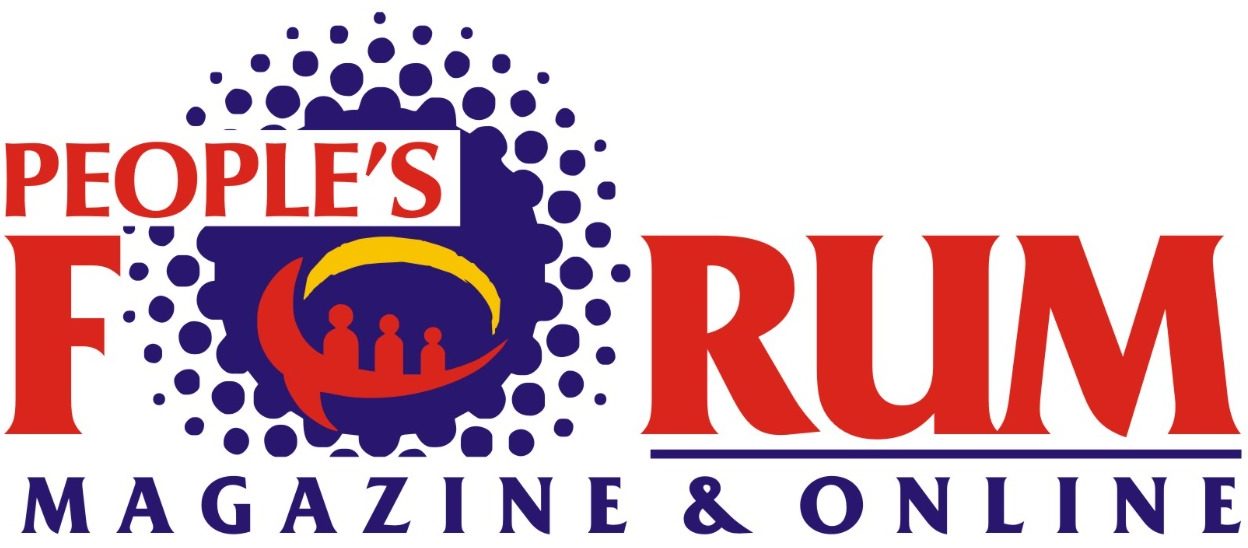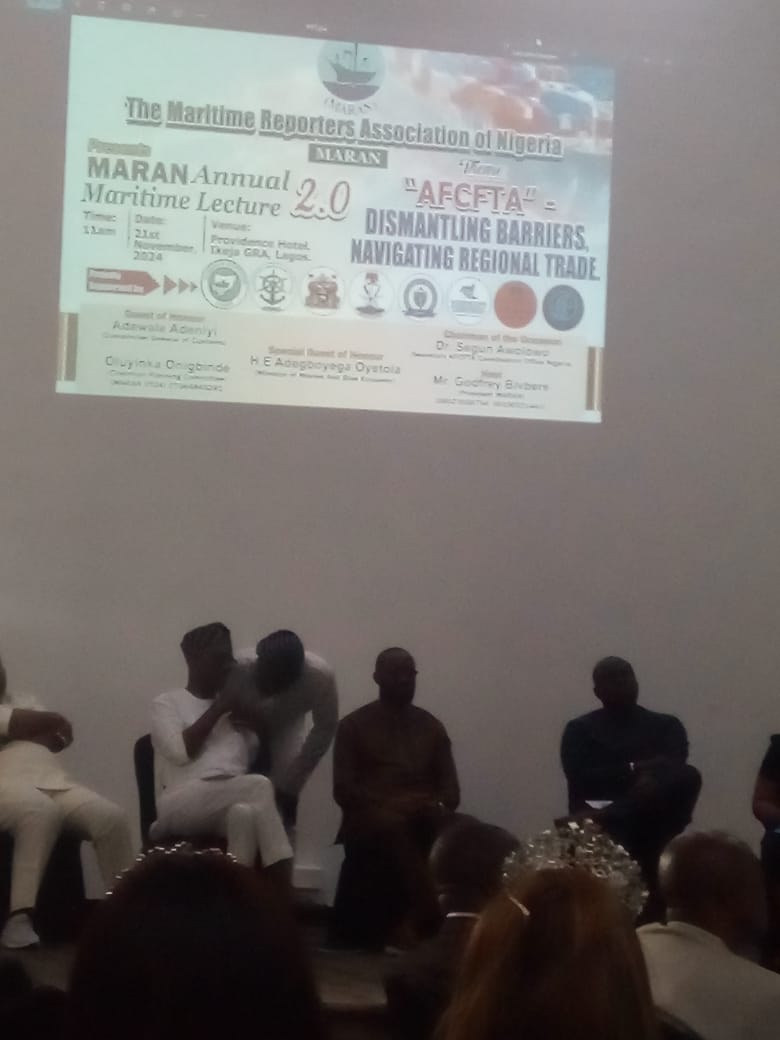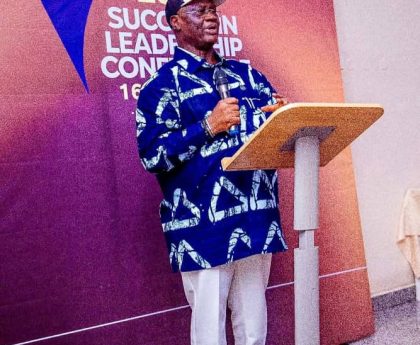The Minister of Marine and Blue Economy, Engr. Adegboyega Oyetola has noted that Nigeria’s commitment to the African Continental Free Trade Area (AfCFTA) has created new export opportunities for the marine sector.
According to the minister, under the Guided Trade Initiative (GTI), Nigeria has already commenced shipments, paving the way for increased trade flows across Africa.
Oyetola who gave a keynote address at the Maritime Reporters Association of Nigeria (MARAN) Annual Maritime Lecture with the theme “AfCFTA- Dismantling Barriers, Navigating Regional Trade”, in Ikeja, Lagos on Thursday, disclosed that the Federal Ministry of Marine and Blue Economy, through the Nigerian Ports Authority (NPA), has also licenced several Export Processing Terminals (EPTs), which fast-track export procedures and enhance the efficiency of trade processes under the AfCFTA.
Represented by his Media Assistant, Mr. Ismael Omipidan, the minister stated that in July this year, Nigeria recorded a significant milestone in her march to economic recovery, following the inaugural shipment ceremony under the Guided Trade Initiative (GTI) of the African Continental Free Trade Agreement (AfCFTA).
The minister described the development as a crucial step towards an enhanced trade and economic cooperation on the continent.
He maintained that in today’s interdependent and globalized world, efficient and cost-effective maritime transportation systems that link global supply chains are the engine that would ultimately fuel economic development and prosperity.
Oyetola said the obvious that maritime transport is a strategic economic trade enabler because 80% of global merchandise trade by volume is carried out by sea and handled by ports worldwide as estimated by UNCTAD.
“In Africa, as with the rest of the world, the importance of seaports to trade, and therefore to the continent’s economic performance cannot be overemphasized. With around 90% of Africa’s trade (including imports and exports) conducted through seaports, maritime transportation plays a vital role in facilitating trade in most African countries due to the continent’s high dependency on exports of raw materials and imports of food, manufactured goods and fuel.
“By promoting intra-Africa trade through the removal of national barriers, doors of opportunities are opened to businesses to reach continental markets, thereby fostering industrialisation, job creation and economic growth.
“This underscores the need for investment in port infrastructure and improvement in our institutional capacities for management and administration. This is the rationale for the current thrust of the Ministry and its Agencies’ drive on port modernisation. Investments in physical facilities must be complemented with process and system improvements.
“We have demonstrated our commitment to repositioning the Port Ecosystem for greater efficiency via various government initiatives and interventions. These interventions are yielding positive results, as affirmed by the Presidential Enabling Business Environment Council (PEBEC). The top performance rating of both the Ministry and its agencies, NPA and NIMASA, at the recently- concluded 120 Days Regulatory Reform Accelerator (RRA) is indeed a heartwarming indication of this commitment,” the minister said.
He disclosed that to support the successful implementation of the AfCFTA, the Federal Ministry of Marine and Blue Economy has taken bold and decisive steps to significantly enhance the efficiency and competitiveness of Nigerian ports. He added that the licensing of Export Processing Terminals (EPTs) will greatly increase the export of Nigerian commodities and will simplify the shipment of goods under the GTI/AfCFTA. He further said that government pursuit of the establishment of more inland dry ports is another initiative to bring shipping closer to the people and facilitate trade.
“We shall continue to push the boundaries of innovation and excellence, driven by our unwavering commitment to progress and our unrelenting passion for shaping a brighter future for the Marine and Blue Economy sector through various initiatives such as:
Regional integration and collaboration to drive maritime security and safety; continuous partnerships with the private sector and players to drive efficiency; and innovation; and investment in port IT systems to improve procedure, controls, and turn-around time.
“As we set out on this transformative journey of guided trade under the AfCFTA, I must emphasize the need to embrace the core principles of collaboration, innovation, and sustainability. By working in concert, we can unlock the full potential of shipping and maritime transportation to drive economic growth and build a prosperous future for our continent.
“We are at the threshold of unlocking Nigeria’s blue economy potential and the opportunities offered by AfCFTA are exciting. The combination of blue economy potential and the opportunities offered by AfCFTA hold immense expectation for Africa’s development and economic transformation. There is a compelling need for Nigeria to latch on this momentous opportunity to forge a prosperous and resilient future for Africa, where the blue economy and the AfCFTA converge to drive inclusive, sustainable, and equitable development across the continent, creating a brighter future for generations to come,” the minister further said.
In his welcome address, the President of MARAN, Mr. Godfrey Bivbere, emphasized that the maritime sector remains the backbone of international trade but noted that there are barriers such as inadequate infrastructure, regulatory bottlenecks, and operational inefficiencies which continue to hinder seamless flow of goods across the continent.
The MARAN President averred that breaking down barriers and fostering closer economic ties will pave way for unprecedented opportunities, growth and prosperity.
He was optimistic that the day’s discussions will explore how Nigerians can collectively tackle the challenges, leverage the opportunities presented by AfCFTA and position Nigeria and Africa at large to benefit from the estimated $3.4 trillion trade opportunities.





